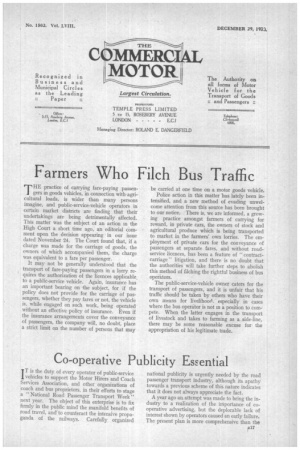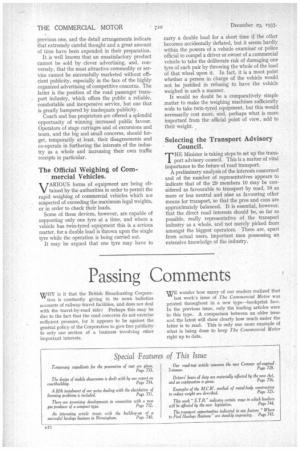Co-operative Publicity Essential
Page 27

Page 28

If you've noticed an error in this article please click here to report it so we can fix it.
T is the duty of every operator of public-service !vehicles to support the Motor Hirers and Coach Services Association, and other organizations of coach and bus proprietors, in their efforts to stage a "National Road Passenger Transport Week" next year. The object of this enterprise is to fix firmly in the public mind the manifold benefits of road travel, and to counteract the intensive propaganda of the railways. Carefully organized national publicity is urgently needed by the road passenger transport industry, although its apathy towards a previous scheme of this nature indicates that it does not always appreciate the fact.
A year ago an. attempt was made to bring the industry to a realization of the importance of cooperative advertising, but the deplorable lack of interest shown by operators caused an early failure. The present plan is more comprehensive than the previous one, and the detail arrangements indicate that extremely careful thought and a great amount of time have been expended in their preparation.
It is well known that an unsatisfactory product cannot be sold by clever advertising, and, conversely, that the most attractive commodity or service cannot be successfully marketed without efficient publicity, especially in the face of the highly organized advertising of competitive concerns. The latter is the position of the road passenger transport industry, which offers the public a reliable, comfortable and inexpensive service, but one that is greatly hampered by inadequate publicity.
Coach and bus proprietors are offered a splendid opportunity of winning increased public favour. Operators of stage carriages and of excursions and tours, and the big and small concerns, should forget, temporarily at least, their disagreements and co-operate in furthering the interests of the industry as a whole and increasing their own traffic receipts in particular.
The Official Weighing of Commercial Vehicles.
VARIOUS forms of equipment are being obtained by the authorities in order to permit the rapid weighing of commercial vehicles which ate suspected of exceeding the maximum legal weights, or in order to check their loads.
Some of these devices, however, are capable of supporting only one tyre at a time, and where a vehicle has twin-tyred equipment this is a serious matter, for a double load is thrown upon the single tyre while the operation is being carried out.
It may be argued that one tyre may have to carry a double load for a short time if the other becomes accidentally deflated, but it seems hardly within the powers of a vehicle examiner or police official to compel a driver or owner of a commercial vehicle to take the deliberate risk of damaging one tyre of each pair by throwing the whole of the load of that wheel upon it. In fact, it is a moot point whether a person in charge of the vehicle would not be justified in refusing to have the vehicle weighed in such a manner.
It would no doubt be a comparatively simple matter to make the weighing machines sufficiently wide to take twin-tyred equipment, but this would necessarily cost more, and, perhaps what is more important from the official point of view, add to their weight. ,
Selecting the Transport Advisory Council.
M HE Minister is taking steps to set up the trans' port advisory council. This is a matter of vital importance to the future of road transport. A preliminary analysis of the interests concerned and of the number of representatives appears to indicate that of the 29 members 10 may be considered as favourable to transport by road, 10 as more or less neutral and nine as favouring other means for transport, so that the pros and cons are approximately balanced. It is essential, however. that the direct road interests should be, so far as possible, really representative of the transport industry as a whole, and not merely picked from amongst the biggest operators. There are, apart from actual users, important men possessing an extensive knowledge of the industry.




















































































